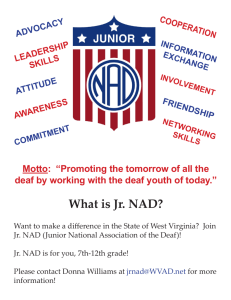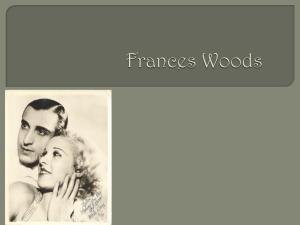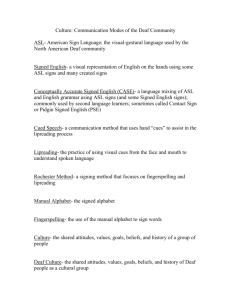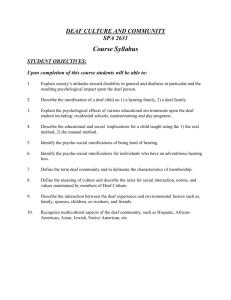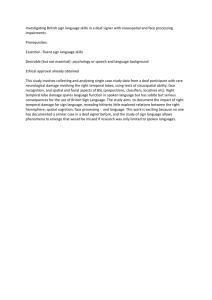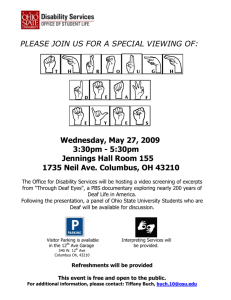Millie Brother Scholarship Full Award 2015 Assimilation Isabeau
advertisement
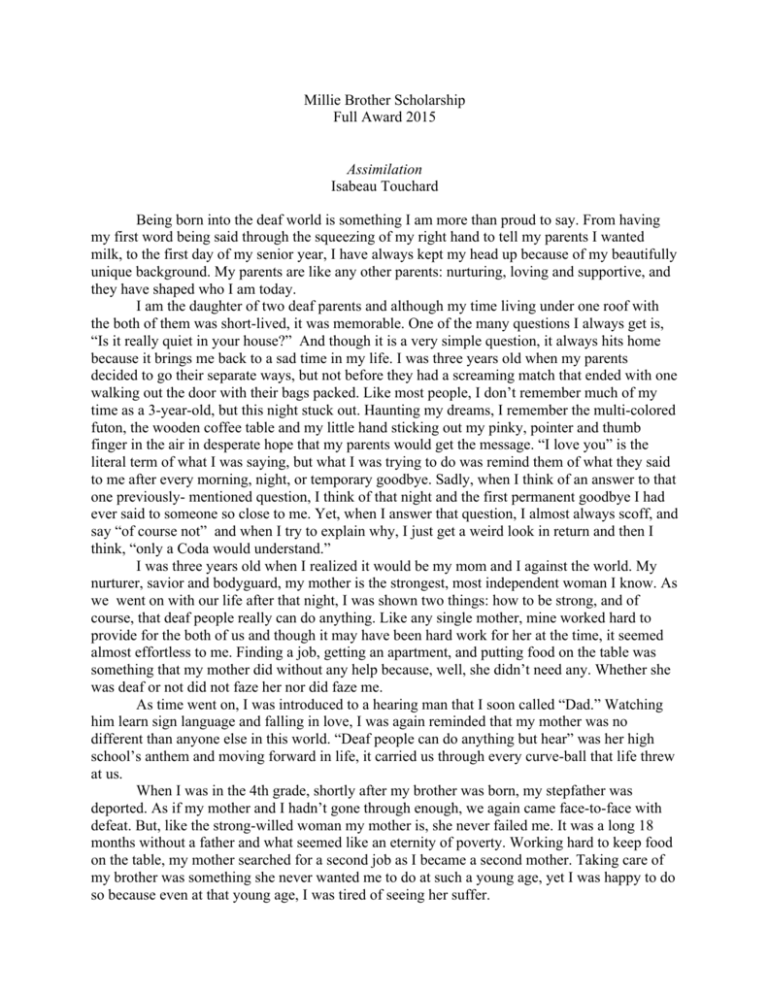
Millie Brother Scholarship Full Award 2015 Assimilation Isabeau Touchard Being born into the deaf world is something I am more than proud to say. From having my first word being said through the squeezing of my right hand to tell my parents I wanted milk, to the first day of my senior year, I have always kept my head up because of my beautifully unique background. My parents are like any other parents: nurturing, loving and supportive, and they have shaped who I am today. I am the daughter of two deaf parents and although my time living under one roof with the both of them was short-lived, it was memorable. One of the many questions I always get is, “Is it really quiet in your house?” And though it is a very simple question, it always hits home because it brings me back to a sad time in my life. I was three years old when my parents decided to go their separate ways, but not before they had a screaming match that ended with one walking out the door with their bags packed. Like most people, I don’t remember much of my time as a 3-year-old, but this night stuck out. Haunting my dreams, I remember the multi-colored futon, the wooden coffee table and my little hand sticking out my pinky, pointer and thumb finger in the air in desperate hope that my parents would get the message. “I love you” is the literal term of what I was saying, but what I was trying to do was remind them of what they said to me after every morning, night, or temporary goodbye. Sadly, when I think of an answer to that one previously- mentioned question, I think of that night and the first permanent goodbye I had ever said to someone so close to me. Yet, when I answer that question, I almost always scoff, and say “of course not” and when I try to explain why, I just get a weird look in return and then I think, “only a Coda would understand.” I was three years old when I realized it would be my mom and I against the world. My nurturer, savior and bodyguard, my mother is the strongest, most independent woman I know. As we went on with our life after that night, I was shown two things: how to be strong, and of course, that deaf people really can do anything. Like any single mother, mine worked hard to provide for the both of us and though it may have been hard work for her at the time, it seemed almost effortless to me. Finding a job, getting an apartment, and putting food on the table was something that my mother did without any help because, well, she didn’t need any. Whether she was deaf or not did not faze her nor did faze me. As time went on, I was introduced to a hearing man that I soon called “Dad.” Watching him learn sign language and falling in love, I was again reminded that my mother was no different than anyone else in this world. “Deaf people can do anything but hear” was her high school’s anthem and moving forward in life, it carried us through every curve-ball that life threw at us. When I was in the 4th grade, shortly after my brother was born, my stepfather was deported. As if my mother and I hadn’t gone through enough, we again came face-to-face with defeat. But, like the strong-willed woman my mother is, she never failed me. It was a long 18 months without a father and what seemed like an eternity of poverty. Working hard to keep food on the table, my mother searched for a second job as I became a second mother. Taking care of my brother was something she never wanted me to do at such a young age, yet I was happy to do so because even at that young age, I was tired of seeing her suffer. There were nights where I ignorantly cried myself to sleep because I wasn’t like the other kids in my class. “They have nice clothes,” I thought “They eat wherever and whenever” I complained, and sometimes, as ashamed of it as I am now, I even wished for “normal” parents. At the time, I was mature but still young and my yearning for the things I wanted far outweighed my yearning for the things I needed. But one night, when I found my mother crying in her bedroom, I realized that I, of all people, had nothing to be upset over. As I sat next to her and lightly pressed my pinky, pointer and thumb fingers against hers like she always did when I cried, I thought about all of things I had to be grateful for. I am grateful for being born into such a unique world. I am grateful for all the things that I once found embarrassing, torturing, and heart-wrenching. I am grateful for finding such a great father in a man new to this country and new to my world. But most of all, I am grateful to have the honor of sharing the same blood as someone as strong as my deaf mother. The truth is, there is no such thing as “normal” and there will never be. To me, a hearing person is as normal as a deaf, blind or even a mute and I wish everyone else in this world could relate. But, sometimes it takes an eye-opening experience to truly understand the differences between cultures and people and the beauty that life also throws at us. "Your mom can drive?" "How do you say this in sign language?" are just two of the plethora of questions I've been asked by my peers growing up. I cannot tell you how many times I have been asked to teach someone sign language but, for some reason, I love that fact. Whenever I am asked these questions, I feel a sense of gaiety because I know that these inquirers are one step closer to learning about my family’s world. To me, sign language is the key to the gates that bar my foreign family and the rest of the society from understanding the deaf culture. To my mother and I, it is the light at the end of our dark tunnel. Because I am fortunate enough to have that key, the more I teach it, the more happiness it brings me and the more it is taught, the better deaf people are understood in our society. Attending Rochester Institute of Technology in the fall, I am more than ecstatic to say that I am majoring in ASL Interpretation, minoring in deaf education and plan to finish college, which is something my mother never had the opportunity to do. My life would be meaningless without my deaf mother who, like any other "normal" person, cleared the path to my success and the only way I could ever come close to repaying her would be to finish what she started. I am the dream of my mother's future.


